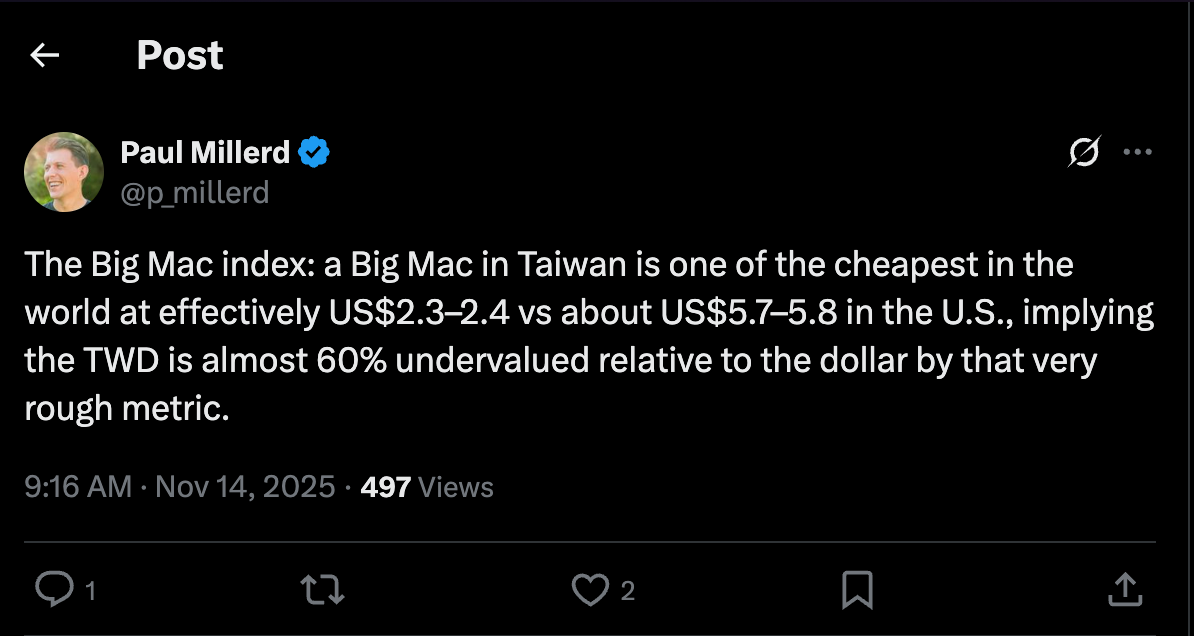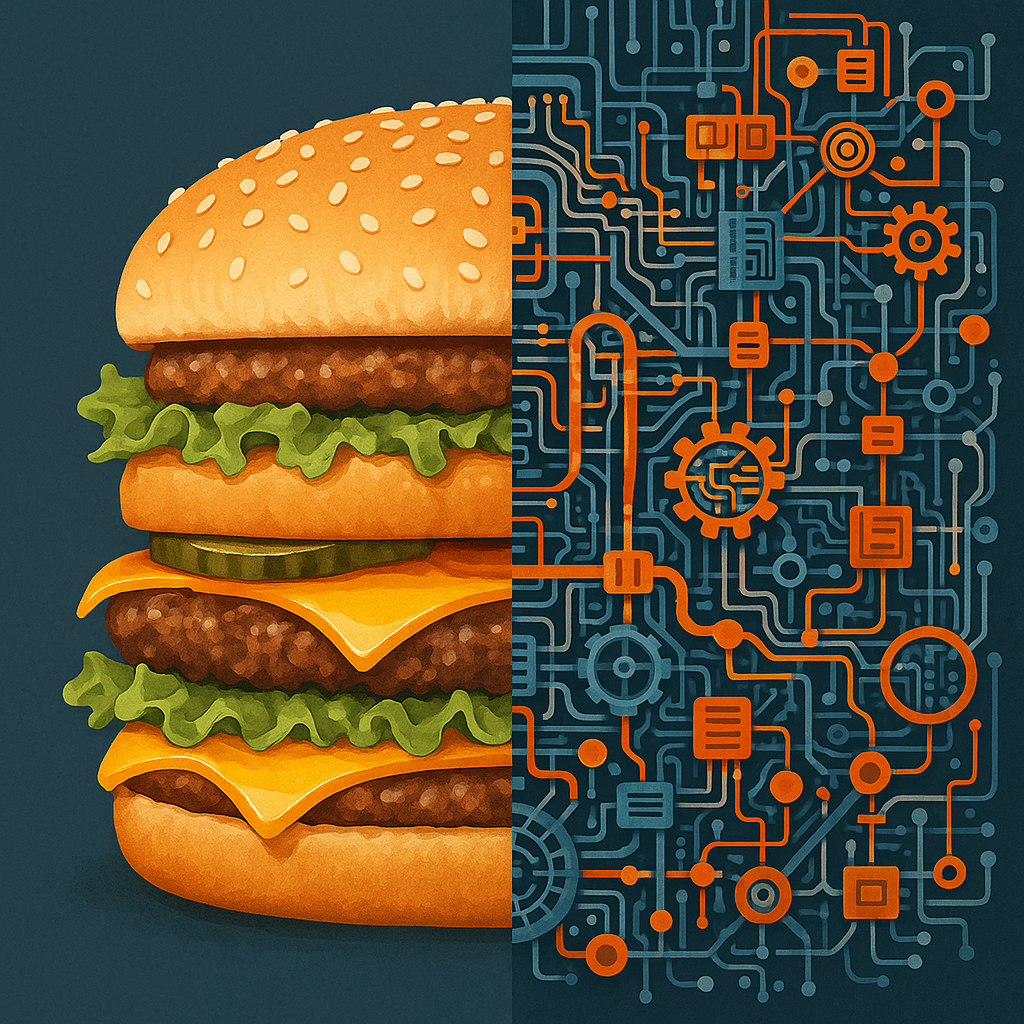Today, Paul Millerd shared one of those deceptively simple observations that hides an entire world of theory underneath:

That’s the classic interpretation.
But there’s another story hiding in plain sight — one that’s much closer to how the world actually works.
It’s not just that Taiwan’s currency is undervalued.
It’s that Taiwan’s complexity is undervalued.
And that’s the key insight behind what I call complexity inflation — the idea that consumer prices reveal how much friction, bureaucracy, and wasted time a society imposes on itself just to maintain basic life-support systems.
This is where the Big Mac Index accidentally becomes something much deeper:
A Big Mac doesn’t measure purchasing power.
It measures how efficient a society is at coordinating itself.
Let me explain.
The Big Mac Is a Complexity Benchmark, Not a Burger
A Big Mac is not a burger.
It’s a civilization test.
32 ingredients and components have to move through:
- energy grids
- agricultural supply chains
- cold chain logistics
- labor markets
- food safety regulations
- zoning laws
- real estate markets
- franchise oversight
- transit networks
- digital ordering systems
- local and national compliance layers
- forecasting and inventory algorithms
To deliver one Big Mac, an entire society has to perform a multi-layered, perfectly timed dance.
Same ingredients.
Same branding.
Same recipe.
So if the final price changes dramatically, it’s not the burger that changed. It’s the society.
That is why the Big Mac Index is a brilliant — if accidental — metric for:
Complexity Inflation: the extra cost baked into everyday life because a society requires more friction to function.
Higher price = more invisible complexity taxes.
Lower price = fewer complexity taxes.
Which brings us back to Taiwan.
Why Taiwan’s Big Mac Is So Cheap: Low Time Violence
Taiwan is one of the rare places in the world where extreme technological sophistication coexists with remarkably low everyday friction.
This means:
- stable logistics
- predictable service patterns
- minimal bureaucratic churn
- fast, reliable transit
- efficient energy distribution
- low cognitive overhead in daily life
- less variance → less buffer stock → less waste
- a cultural norm of smooth coordination
In practice?
It just takes less complexity to deliver a Big Mac.
Less unnecessary motion.
Less paperwork.
Less uncertainty.
Less hedging against system failure.
Less “time violence” inflicted on workers and customers.
Taiwan is a living demonstration that:
Complexity and friction are not the same thing.
A society can run complex systems without becoming a complex society.
This is the distinction almost every Western institution has forgotten.
The U.S. Big Mac Is Expensive Because the U.S. Is Expensive to Operate
In the U.S., the Big Mac is not $5.80 because beef or lettuce is expensive.
It’s $5.80 because:
- the labor market is turbulent
- compliance regimes are sprawling
- healthcare overhead is baked into everything
- real estate costs amplify across supply chains
- energy grids are unstable
- logistics are unpredictable
- every part of the system has to absorb more risk
- variance has increased → requiring more waste buffers
- cognitive load is higher for every worker at every station
- admin overhead is now its own ecosystem feeding on itself
The U.S. isn’t just suffering price inflation.
It’s suffering complexity inflation.
And the Big Mac Index reveals that better than almost any macroeconomic metric we have.
Currency Mispricing or Complexity Mispricing?
Economists interpret the Big Mac gap like this:
“Taiwan’s currency is undervalued by 60%.”
But from a complexity lens, the more interesting interpretation is:
“Taiwan’s systems are so well-coordinated that they can deliver a global product with 60% less friction.”
And:
“The U.S. systems are so misaligned that they require almost 2.5× the friction to deliver the same outcome.”
That is the true signal.
Currency is just the surface-level shadow of an underlying reality:
Price is the cost of complexity.
The Big Mac Index Was Always About Complexity — We Just Didn’t See It
When you fix the product and the inputs, the variable becomes the system that delivers it.
This is why the Big Mac Index is quietly one of the most important economic signals of our time:
It gives us a globalized, standardized measurement of how much time, friction, and complexity each society imposes on itself.
If you take the classic formula of Time Violence:
TV(S) = Ops_Score × (1 + Info_Score)
Then the price of a Big Mac is effectively:
Price(BigMac) ≈ Raw Inputs + f(TV(S))
Which means:
Big Mac = Time Violence Meter
Cheap Big Mac → low system friction, high stability, low complexity inflation.
Expensive Big Mac → high friction, high variance, high complexity inflation.
It’s not just a burger.
It’s a diagnostic tool.
Taiwan as the “Low Complexity Equilibrium”
In my research, I talk about the idea of low-Time-Violence equilibria — societies where systems absorb complexity rather than pushing it down to individuals.
Taiwan gets closer to this ideal than almost anywhere:
- coordination is cultural
- norms reduce uncertainty
- rules serve clarity instead of confusion
- bureaucracy exists but does not metastasize
- variance is minimized
- systems self-correct instead of self-complicate
- complexity is designed for humans, not extracted from them
This is the difference between a society that’s merely modern and one that is consciously engineered for human coherence.
So What Does This All Mean for the World?
Three takeaways:
1. Inflation statistics are missing the real story
The world is not suffering from “inflation” as much as it is from complexity inflation — the rising cost of keeping systems coherent.
2. Complexity is the new currency
The real advantage in global competition isn’t cheap labor or fast tech.
It’s having systems that don’t require vast amounts of friction and administrative entropy just to function.
3. Time is the new unit of value
Every dollar of consumer price is a shadow price of the time the system stole from someone:
- the worker
- the manager
- the regulator
- the logistics chain
- the customer
- the society
Lower price doesn’t mean “cheaper society.”
It means a society that doesn’t waste as much time.
Closing Thought: The Big Mac Index Is Really the Time Violence Index
What we thought was a currency measure turns out to be something far more revealing:
The Big Mac Index is a global audit of how much unnecessary complexity each society forces into the everyday.
Taiwan shows us what it looks like when you get the formula right.
The U.S. shows what it looks like when complexity grows faster than coherence.
And the Big Mac sits quietly in the middle, revealing the truth:
Every price is a story about time.
Every price is a story about complexity.
Every price is a story about how well a society aligns itself with reality.
The Big Mac Index just gave us a way to measure it.
